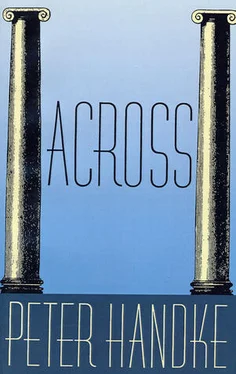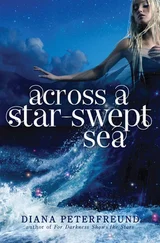Peter Handke - Across
Здесь есть возможность читать онлайн «Peter Handke - Across» весь текст электронной книги совершенно бесплатно (целиком полную версию без сокращений). В некоторых случаях можно слушать аудио, скачать через торрент в формате fb2 и присутствует краткое содержание. Год выпуска: 2000, Издательство: Farrar, Straus and Giroux, Жанр: Современная проза, на английском языке. Описание произведения, (предисловие) а так же отзывы посетителей доступны на портале библиотеки ЛибКат.
- Название:Across
- Автор:
- Издательство:Farrar, Straus and Giroux
- Жанр:
- Год:2000
- ISBN:нет данных
- Рейтинг книги:3 / 5. Голосов: 1
-
Избранное:Добавить в избранное
- Отзывы:
-
Ваша оценка:
- 60
- 1
- 2
- 3
- 4
- 5
Across: краткое содержание, описание и аннотация
Предлагаем к чтению аннотацию, описание, краткое содержание или предисловие (зависит от того, что написал сам автор книги «Across»). Если вы не нашли необходимую информацию о книге — напишите в комментариях, мы постараемся отыскать её.
Across — читать онлайн бесплатно полную книгу (весь текст) целиком
Ниже представлен текст книги, разбитый по страницам. Система сохранения места последней прочитанной страницы, позволяет с удобством читать онлайн бесплатно книгу «Across», без необходимости каждый раз заново искать на чём Вы остановились. Поставьте закладку, и сможете в любой момент перейти на страницу, на которой закончили чтение.
Интервал:
Закладка:
As she spoke, I recovered my eye for her. Years before, in the days of our courtship (yes, I was once capable of courting someone!) I wrote to her in a letter: “We come from two different Earths. I from the planet Carefree and you from the planet Care.” The present visitor also found a refreshing severity in her face. In confronting most people, I first perceive the Gestalt, the overall picture; in her case, what I see first is the eyes, almost black, and below them the whiteness of her throat. (I know there’s no point in trying to describe people, however one goes about it; and yet I sometimes feel I have to say something about her.)
Knowing my son would be on his way home from the athletic field, I decided to head him off. We met on the highway where it passes through a cornfield. Once on the meadow, I saw a clubfooted roadworker with his shovel over his shoulder, walking “under the sky”; that was how I now saw my son, carrying a soccer ball in a string bag, walking under the sky; meandering from side to side of the road, yet determined; and at the same time I heard the scraping of his jean-legs.
The visitor then became the cook. The family gathered for dinner in the winter garden, which is on the west side of the house. My daughter’s friend sat down with us; she was to spend the night. The daylight lingered on. Blades of straw glittered in the dung heaps outside the farms; a glow came from the grass under the fruit trees. One could hear the Autobahn — a steady howl. The point where it crosses the border is nearby: a flickering-flaring light as of an oil field between the trees of the semicircular village hill, which with its jagged spruce crowns makes me think of a sleeping boar; the dark hump gives the little white village church on this side of it the dimensions of a cathedral.
It was getting cold on the porch. The guest brought logs and made a fire in the veranda stove. A so-called dwarf palm from the Isle of Silence — a species which allegedly existed only there — waved its fan, and a primitive-looking hare sleeping at its feet twitched a nostril. One of the girls said she wanted a house where there would be a room for everything: a room for stones, a room for plants, a room just for school. A roaring in the east, from the direction of the airfield, meant Frankfurt; another, Linz; another, Amsterdam.
The cook washed the dishes. The woman came into the kitchen with a book, and read aloud a passage from the correspondence of a married couple at the turn of the century: “Your constant absence has given me a higher life, a spiritual drive that would otherwise have remained unknown to me.” She added on her own: “One sex says that to another; but mightn’t a human being say the same to God?” Then we all watched the television news together, and afterward someone cried out: “But some sort of immortality must be possible!”
I went up to the attic and knocked at my son’s door. He said to me in a bass voice: “Don’t stand there so respectfully.” It seems he had heard from his schoolmates that I had been wandering aimlessly about the town, “like a lunatic”; one had told him how I’d been seen coming out of a public toilet and the attendant had called after me: “Never let me see your face again.” He himself had once seen me sitting on a bench between two full plastic bags, “like a tramp.”
Only a flashlight was on, and the attic room was in half-darkness. Little knickknacks, mostly metal or glass, gave the wall over the desk the look of a pilot’s instrument panel at night. We now had the whole plain outside to ourselves. Green was the last color, then everything turned black, traversed by chains of lights. I sat down on the stool beside my son’s desk chair and said: “I have a story to tell you. It’s called Threshold Story.”
But before the storyteller began, he paused for a moment and said, addressing himself: “Stop. Everything depends on finding the right order.” While telling the story, he kept his lids lowered; sometimes his eyes flashed, as though in jubilation. He concluded with the words: “I need you as my witness.”
The listener’s answer was as follows: “And I thought my father was just a little rebellious off and on.”
The narrator opened his eyes, unfolded his hands, uncrossed his legs, sat up straight, breathed deeply, and then looked imploringly over his shoulder into empty space, as though waiting for someone or remembering someone; or as though collecting himself for a very different story. (A story meant: it was, it is, it will be — it meant future.) But first he lay down on the floor of his son’s room and slept — someone threw a cover over him — a night, a day, and yet another night. And he had a dream: “The storyteller is the threshold. He must therefore stop and collect himself.”
Epilogue
There’s a special breeze on the bridge. It’s not only the river that creates a breeze of its own; so does the slightly raised canal as it flows across the country. On the surface, the water is so smooth that it seems to stand still, as in a bathtub or a watering trough, while the dark, whirling leaves just below give the impression of a violent current. Both impressions are deceptive; without hurrying, one can keep pace with the birds’ nests, paper boats, or chestnut blossoms floating on the surface; if anything, one might have to slow down now and then.
The bridge forms a barely perceptible hump in the plain; still, the moped riders crossing it accelerate, some cyclists stand up to pedal, and the headlights of the cars tilt skyward on the way up. Violet swallows skim the water, in which great bundles of grass drift like uprooted islands. The jagged blackish maple leaves on the bottom look something like bats’ wings. The flowing stream seems to be only another form of the stony mountain ridge in the background — its other time form, its dual-aspect picture, its freer manifestation, its lowland self; just as the two frolicking dogs in the meadow to this side of the mountain are only its transposition, its cellular division, its transformation into something infinitesimal but full of life. The two frolicking dogs are transformed into a closely intertwined couple; and the couple in turn into a child with a hood.
On the bank, a lilac bush is in bloom, and toward evening the mountains in the distance take on the color of lilac. An old man is standing on the bridge. His eyes are half closed and he says: “This canal is so quiet, so unassuming, so modest. This water must conquer.” A girl in a white coverall stops her bicycle for a moment and, resting one foot on the railing, lights a cigarette. The tall grass at the edge of the road, even the stiff thistles, rustle like reeds in the breeze. A blackbird sings in a willow tree, almost hidden by the foliage but instantly recognizable by its iridescent throat, which changes its hue from note to note. The willow moves when the water beneath it moves. And now a whole country murmurs in the solitary spruce; for a moment, indeed, the sky of all Europe shines blue over the empty bridge.
The first rain dabs circles in the water, which float a little way before losing themselves. The falling snow, however, leaves no trace in the canal; its flakes are instantly expunged by the current. A bright-bellied fish, large for so narrow a stream, leaps high into the air like a dolphin on one side of the bridge, and does it again on the other side. A duck paddles back and forth between the banks like a ferryboat; when a dog comes running, the duck lifts its head and, impassive, lets itself drift downstream. After the rain, steam rises from the bridge and there’s a smell of wood in the air.
Whenever a truck drives over the planks, the bridge sways under the feet of the man standing there, as it used to do under peasants’ carts; and, at the bottom of the canal, swarms of hitherto invisible little fish scatter. At times, though, there’s nothing but water flowing downstream, no objects, no animals — only the pure element; now clear, now cloudy; birch-white, sky-yellow, rock-gray, flesh-colored, cloud-colored, iron-blue, earth-brown, grass-green, peat-black, cistern-black, utterly soundless; only where a branch hangs down into it — or in a narrow place — there’s a gurgling as from a hidden spring. Sometimes the element is the color of memory; comparable to nothing, just remembering. Toward evening, glittering spirals drift with the otherwise darkened mass.
Читать дальшеИнтервал:
Закладка:
Похожие книги на «Across»
Представляем Вашему вниманию похожие книги на «Across» списком для выбора. Мы отобрали схожую по названию и смыслу литературу в надежде предоставить читателям больше вариантов отыскать новые, интересные, ещё непрочитанные произведения.
Обсуждение, отзывы о книге «Across» и просто собственные мнения читателей. Оставьте ваши комментарии, напишите, что Вы думаете о произведении, его смысле или главных героях. Укажите что конкретно понравилось, а что нет, и почему Вы так считаете.












